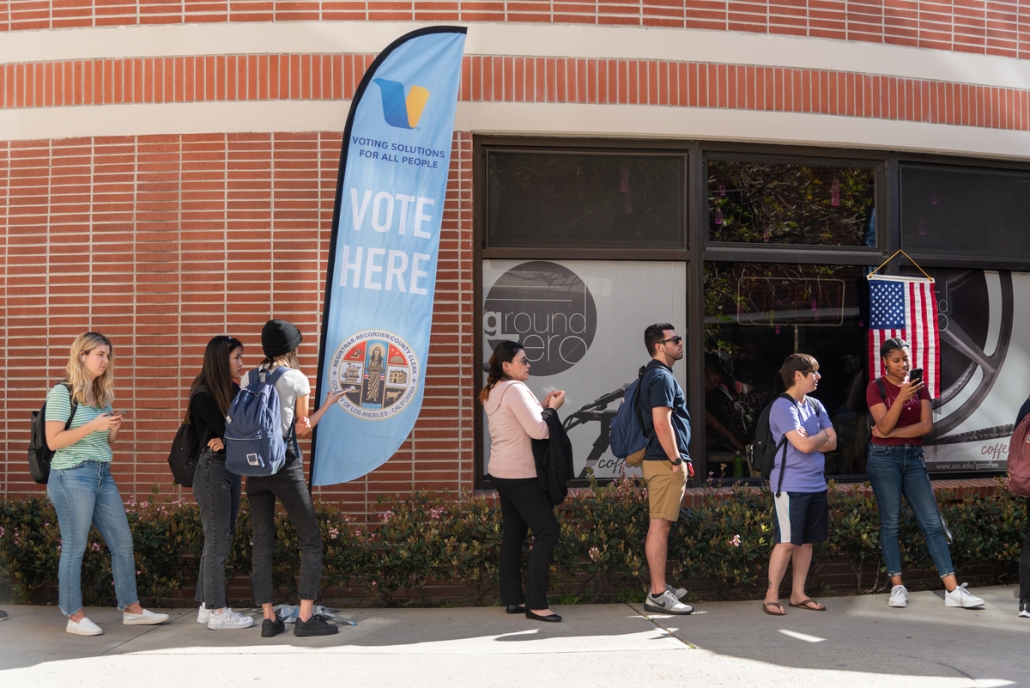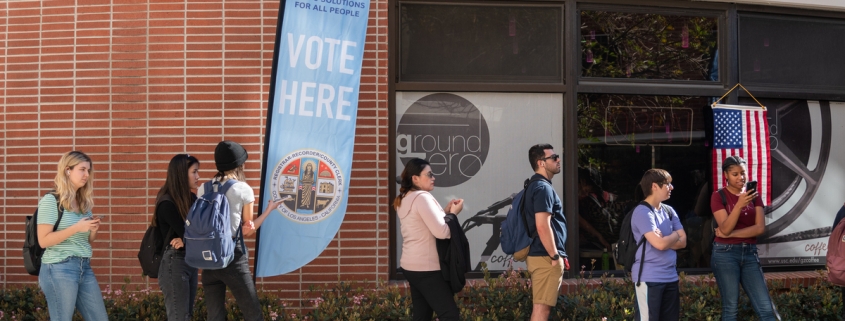Low young-adult voter turnout is the result of voter suppression, not laziness

There is a prevalent, long-standing idea that young people — specifically, ages 18 to 29 — chose not to vote. Statistics comparing the 2020 Democratic primaries and 2018 Midterm elections to previous elections provided by the United State census seem to support this notion: In 2014, the 18-29 year old vote made up 20% of total voters and in the 2020 primary elections, young-adult voters made up less than 20% of the vote.
However, it only takes a few minutes scrolling through Twitter or Instagram to recognize that young adults are heavily involved in politics. In 2016, about 90% of young voters showed an interest in politics, with 80% intending to vote; thus, disproving that this age group of 18-29 is disengaged from the political scene. This, then, begs the question of where the disconnect between political involvement and political action among 18-29 year olds lies and why college students and young adults are not making it to the polls.
“Kids are lazy” and “kids are too young to understand politics” are comments often spewed from all ends of the political spectrum and aimed as attacks on young adults. After the last Super Tuesday, many Democrats went so far as to blame young adults for the low voter turnout and Sen. Bernie Sanders’s loss. That being said, addressing the issue of low young-adult voter turnout is not that simple when all factors are considered.
First, these tired stereotypes of “laziness” and “naiveté” both fall under the umbrella of ageism. Ibram X. Kendi, director of the Boston University Center for Antiracist Research, explained how claiming something is inherently wrong with young adults is equivalent to saying something is inferior about young adults, thus expressing an ageist idea.
Neither laziness nor hypocrisy are exclusive to 18-29 year olds, and there is thus no logical basis to hastily attribute these traits to all young people. Propagating this not only discourages them from taking part in this system, it also deflects from a much greater cause of young-adult voter suppression.
Voter suppression is something many social groups face, young people among them. The reasoning behind why the 18-29 year old vote would even be worth suppressing has much to do with the simple fact that most colleges and universities —as well as their student bodies — skew left. At a time when the popular vote seems to favor Democratic presidential nominee Joe Biden and President Donald Trump has turned to questioning the credibility of mail-in ballots from “blue” states and is accused of suppressing votes by flip-flopping on defunding the United States Postal Service, it does not seem absurd to think liberal college students would be deprived of the fulfillment of their civic duty.
In Texas, University of Texas at Austin students only had two nearby polling stations this past primary election, culminating in long lines and many potential voters being forced to leave before casting their ballot due to work and class. In fact, polling stations in close proximity to colleges are rare. In a Daily Trojan op-ed written during the primary elections in January, students saw how close to home this lack of accessibility truly is as USC lagged behind UCLA in making voting more accessible to students.
Along with not having easy access to voting stations, something unique to college students are strict voter requirements by location. College students tend not to have a permanent home over the course of their college education. This can manifest as having a home in one state but moving out-of-state for college or living in dorms then moving to an apartment. States require identification of a permanent resident address, which a lot of college students do not have as seen in FindLaw’s research of young-adult voter suppression.
In some cases, college students also have to have a state ID to register to vote, which can take months to arrive. Most states also have confusing registration deadlines — same-day registration is becoming less and less common despite the link between allowing for same-day registration and increased voter participation and some states do not offer online registration. Only 18 states and the District of Columbia offer pre-registration for 16-year-olds, and civics is often no longer a requirement in high schools..
This accumulation of requirements, prerequisites and lack of resources all amount to an inherent problem in today’s voting system. Especially in the era of the coronavirus, where online registration and mail-in ballots could make all the difference in young adult voter turnout, this is troubling.
So, no, college students and young adults are neither lazy nor uneducated. Rather, the voting system is systematically pitted against them. The question lies in how to address this problem. The most challenging thing about young-adult voter suppression is actually getting young adults to talk about it. It seems simple to accept stereotypes as truth rather than question them.
The second shortcoming lies in the difference between knowing about a problem and acting on it. Young adults have been at the forefront of demands for social justice and policy action, which must spill over to fighting for registration accessibility and the right to vote.
This goes farther than calling followers to “register to vote” on an Instagram story — there has to be an active stream of young people sending voter registration resources to each other as well as calls to action from young adults to politicians to make registering and requesting mail-in ballots easier. Voting in a democratic society should never be this difficult or this insidious.

